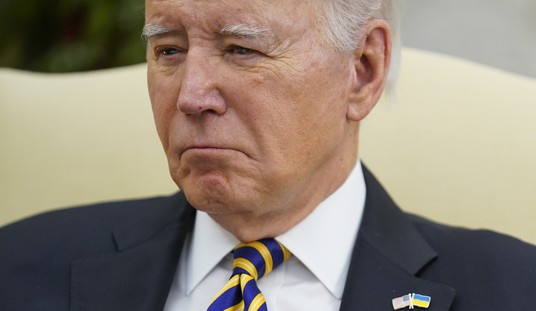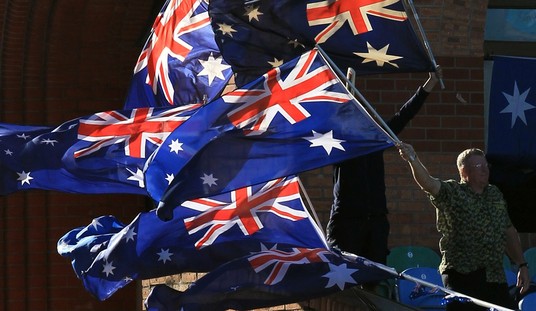Al-Qaeda has taken revenge for the killing of Osama Bin Laden by blowing up 80 Pakistanis. “Bin Laden’s followers have vowed revenge for his death and the Pakistani Taliban said the attack by two suicide bombers on a paramilitary academy in the north-western town of Charsadda was their first taste of vengeance.”
‘We have done this to avenge the Abbottabad incident,’ said Ahsanullah Ahsan, a spokesman for the Pakistani Taliban. He warned that the group was also planning attacks on Americans living inside Pakistan. The attackers struck as the recruits were going on leave and 65 of them were among the 80 dead. Pools of blood strewn with soldiers caps and shoes lay on the road outside the academy as the wounded, looking dazed with parts of their clothes ripped away by shrapnel, were loaded into trucks.
But according to the LA Times the Pakistanis are blaming America for these new tragedies. Alex Rodriguez, reporting from Peshawar says, “twin suicide bombings Friday that killed at least 80 paramilitary recruits in northwest Pakistan, in an attack that Taliban militants said was to avenge the killing of Osama bin Laden by U.S. commandos, could trigger new doubts among Pakistanis about the value of Islamabad’s already rocky relationship with Washington.”
Pakistanis have grown increasingly worried that they will bear the brunt of retaliatory attacks by militants angered by the May 2 killing of the Al Qaeda leader. U.S. Navy SEALs killed Bin Laden at the compound in the garrison city of Abbottabad where he had hidden for five years. Washington’s decision to carry out the mission without Islamabad’s knowledge or authorization angered many Pakistanis who saw the raid as a gross violation of their country’s sovereignty.
Reacting to news of the suicide bombings, Bashir Bilour, a senior minister for Khyber-Pakhtunkhwa province, questioned whether, despite the billions of dollars that Pakistan receives from Washington in civilian and military aid, the country was paying too heavy a price for its role as a U.S. ally.
Why should they blame America and not the Taliban? Because. Whether it is intervening in Libya or not intervening in Libya; finding Osama bin Laden or not finding him; taking notice of Pakistan’s troubles or not taking notice of Pakistan; feeding the North Korean population or not feeding the North Korean population; inventing the Internet and then not giving the Internet to the UN; developing GPS and then not giving it to the United Nations — in all the uncertainty of the modern world — on thing remains constant: it’s always America’s fault.
John Burroughs argued that the tendency to blame others was the ultimate admission of failure. It was an acceptance of the inability to change one’s destiny and therefore the belief that someone else was in the control of it. The tendency to “blame America” is simply a restatement of the conviction that “I am helpless and therefore everything that happens to me is caused by the the most powerful object around”. It is fundamentally a religious analogy.
President Obama may be correct in believing that the more successful the United States becomes, the more it will be hated. Psychologically, the only way out is to make it seem smaller; the task of putting down the imperial burden requires becoming ‘just another country’. In that view, once the United States becomes no different from the Congo then nobody will ascribe events that transpire in Pakistan to it. American exceptionalism is the ultimate source of hatred directed towards it. Become unexceptional and the hate goes away.
The Atlantic Wire argues that the notion of “American exceptionalism” is at the source of many problems. It is a guilty phrase, the article argues, nothing more than racist shorthand for asserting that people like President Obama don’t belong, even though the electorate voted for him. It quotes the Guardian which accuses Sarah Palin of maintaining that Americans are better than anyone else. It asserts that the Tea Party is really a coded and doomed attempt at recovering the idea of national superiority. It noted with amusement arguments that Americans bridled at TSA restrictions out of some national attachment to freedom. “This skepticism of governmental authority is healthy. What is more, it is patently American. … The TSA passenger rebellion is merely the latest example of American exceptionalism and is perfectly in keeping with the nation’s ethos.” The Atlantic Wire goes on to quote Cathy Lynn Grossman at USA Today. “Republicans are making political hay by reviving this idea — as old as the first colonialists — that this is a land favored by the Lord with an exceptional destiny.” It cites Michael Scheuer as saying that American exceptionalism has led to four presidents straight trying to remake the Muslim world.
But the problem is that if the USA stopped, it would still be blamed for the mayhem that would ensue from inaction. Libya is a textbook example. It will somehow be America’s fault if it doesn’t save the tribesmen from the Duck of Death. Samantha Power in her book, “The Problem From Hell” argued that it was America’s responsibility to prevent genocides around the world. She notes with dismay that American policymakers have been reluctant to condemn mass atrocities as genocide or lead international military interventions to save them. Do you know who’s really guilty for all the genocides in the world? It’s Washington for not stopping them. It is a case of damned if you do, damned if you don’t.
But perhaps the biggest psychological reason America is blamed so frequently is not just from the religious habit of looking for a governing idol, but from the ingrained desire to look to the King. America has all the power of a Kingdom without a person sitting on the throne. It is an incomprehensible object for a world where the idea of self-governance doesn’t really exist. In those places things happen because the great and the good do things to commoners. There is always someone, besides oneself, behind an act. The average person is nothing more than an object to be acted upon by the powerful. Food appears on the table, policemen appear in the night, men die or men live because the King in a distant palace orders it.
Much of the world is comfortable with the ways of kings. Fear is a natural condition in that model of governance. As Machiavelli advised his prince, “it is far safer to be feared than loved if you cannot be both.” Pakistanis do not blame al-Qaeda for killing them by the hundred because those are the natural actions of a wounded prince. America on the other hand, maddeningly acts as if events in Pakistan were the responsibility of its people, when everybody knows that all events are decided in Washington. By killing Osama Bin Laden America showed itself to be a greater prince than al-Qaeda? Why does it then not stop al-Qaeda from killing them and put food daily on the Pakistani table? You are a king; act like a king.
The original American sin lay in its rejection of kings. The root of its feeling of exceptionalism was its pride in the belief in individual human responsibility and freedom. But not everyone shares this belief. Even in the 21st century it is still such an alien concept that countries as diverse as European welfare states and tribesmen in the Northwest Frontier intuitively reject it. They want a party, a ruling elite, an aristocracy to guide them, to give them a good life. They want to live in a word where someone is to blame; where you can write to a government department when your pension check comes late in the mail, but in more primitive countries where the rising of the stars and weathers of the world can be laid at the doorstep of someone.
And they see America in all its great magnificence, with its majestic warships plowing the seas, its otherworldly soldiers stomping with ease through the garrison towns of nuclear states, its magical inventions and vast land from sea to shining sea and ask: how can it not be their fault? It must be their responsibility for it cannot be the fault of ants. And ants we are.
In his last will and testament, Osama bin Laden described his determination to be a slave. OBL wrote, “he whom Allah guides, none can lead astray and he whom Allah leads astray, has no guide. And I testify that there is no God be he alone, ascribe no partners to him and I testify that Mohammad is his slave and messenger. We beg him in the highest to accept us in martyrdom along with the righteous of his worshipers and to perish us as Muslims.” He could not — could never see — America except as a pretender to the throne of Allah, coming to make him their slave. The idea that they cared not a fig for enslaving him would never have occurred to him. Neither would the idea that the sunken state of the Islamic world was their own responsibility have occurred either.
The world of Kings, of masters and slaves is not yet ended. Although the great issues that Abraham Lincoln described in the Gettysburg address have long been regarded as settled, they are not. The issue is still before the global parliament. Freedom is still in peril and perhaps will always be. Lincoln said, “it is rather for us to be here dedicated to the great task remaining before us … that we here highly resolve that these dead shall not have died in vain — that this nation, under God, shall have a new birth of freedom — and that government of the people, by the people, for the people, shall not perish from the earth.” That is not and may never be a given.
“No Way In” print edition at Amazon
Tip Jar or Subscribe for $5









Join the conversation as a VIP Member